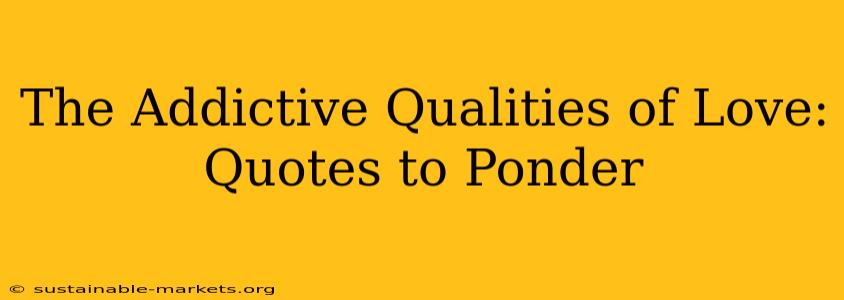Love. That powerful, all-consuming force that can elevate us to euphoric heights and plunge us into the depths of despair. While often celebrated for its beauty and transformative power, love can also exhibit addictive qualities, leaving us craving connection, validation, and the intoxicating rush of romantic passion. This exploration delves into the compelling aspects of love's addictive nature, examining how it mirrors addiction's psychological and physiological mechanisms through insightful quotes and analysis. We'll unravel the complexities of this fascinating duality, looking at both the intensely positive and potentially problematic sides of love's hold on us.
Is Love an Addiction? Understanding the Parallels
The question of whether love is truly an addiction is a complex one, debated by psychologists and philosophers alike. However, many similarities exist between the experience of romantic love and the process of substance addiction. Both involve a powerful reward system in the brain, releasing dopamine and other neurochemicals that create feelings of pleasure and euphoria. This neurochemical response reinforces the behavior—seeking out the loved one, just as an addict seeks their substance of choice.
The intensity of these feelings can lead to obsessive thoughts, preoccupation with the loved one, and even withdrawal symptoms when separated. This mirrors the compulsive behaviors and withdrawal experienced by those struggling with substance addiction. The cyclical nature of longing, connection, and potential disappointment further strengthens the comparison.
What are the Signs of Love Addiction?
Recognizing the signs of love addiction is crucial to maintaining healthy relationships. While passionate love is often intense, love addiction crosses a line into obsession and control. Key indicators include:
- Obsessive Thoughts: Constantly thinking about your partner, even when it interferes with daily life.
- Neglecting Other Responsibilities: Prioritizing your partner to the detriment of work, friendships, or family.
- Low Self-Esteem: Defining your worth solely through your relationship, leading to insecurity and dependence.
- Fear of Abandonment: Experiencing intense anxiety at the thought of separation or rejection.
- Controlling Behavior: Attempting to manipulate or control your partner's actions and choices.
- Idealization: Viewing your partner through rose-tinted glasses, ignoring flaws or red flags.
- Ignoring Red Flags: Dismissing warning signs of abuse or unhealthy dynamics.
If you identify with several of these signs, seeking professional help might be beneficial. A therapist can provide guidance and support to develop healthier relationship patterns.
How Does Love Mimic the Reward System of Addiction?
The brain's reward system plays a crucial role in both love and addiction. When we experience feelings of love, the brain releases dopamine, norepinephrine, and phenylethylamine, neurochemicals associated with pleasure, reward, and motivation. These chemicals create a feeling of intense happiness and euphoria, reinforcing the behavior of seeking out the loved one. The anticipation of seeing or interacting with the beloved also triggers dopamine release, creating a powerful cycle of craving and reward.
Can Love Become Unhealthy or Obsessive?
While passionate love is often intense and all-consuming, it's essential to distinguish between healthy passionate love and unhealthy, obsessive love. Healthy passionate love involves mutual respect, trust, and independence. In contrast, unhealthy obsessive love is characterized by possessiveness, jealousy, control, and a lack of boundaries. This type of love can be incredibly damaging to both partners. It's critical to understand the difference and seek help if your relationship demonstrates unhealthy dynamics.
How Can I Tell the Difference Between Healthy and Unhealthy Love?
Distinguishing between healthy and unhealthy love requires careful self-reflection and honest assessment of your relationship dynamics. Key indicators of a healthy relationship include mutual respect, open communication, trust, individual autonomy, and shared responsibility. Unhealthy relationships are marked by control, manipulation, jealousy, lack of communication, and a constant feeling of unease or anxiety. Remember, a healthy relationship should enhance your life, not detract from it.
Quotes to Ponder on the Addictive Nature of Love
-
"Love is a smoke made with the fume of sighs." – William Shakespeare This quote highlights the ephemeral and potentially overwhelming nature of romantic love, reminiscent of the intoxicating effects of an addiction.
-
"The course of true love never did run smooth." – William Shakespeare This classic quote speaks to the challenges and complexities inherent in love, echoing the unpredictable and often turbulent nature of addiction.
-
"Love is a canvas furnished by nature and embroidered by imagination." – Voltaire This quote emphasizes the subjective and often idealized nature of love, which can contribute to its addictive aspects.
Conclusion: Navigating the Complexities of Love
Love, in its many forms, presents a fascinating paradox. It holds the power to bring immense joy, fulfillment, and connection but can also become a source of obsession and pain. By understanding the neurochemical mechanisms underlying love's addictive qualities and recognizing the signs of unhealthy attachment, we can cultivate more balanced and fulfilling relationships. The journey of love necessitates self-awareness, healthy boundaries, and a commitment to mutual respect and growth.

